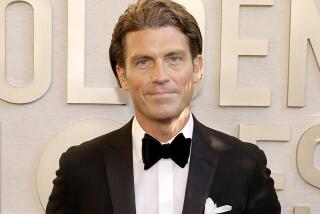Penske Turns to Kmart Service Centers : Transportation: The corporate leader adds the discount chain’s 800 shops to his $5-billion empire. Can he turn this ailing company around too?
- Share via
READING, Pa. — When other teen-agers were monkeying around with cars for fun, Roger Penske was repairing them and selling them--at a pretty good profit.
Forty years later, he hasn’t lost his taste for cars or money.
Best known for forging the most successful Indy-car racing team ever, Penske also holds sway over a $5-billion transportation empire that includes rental trucks, diesel engines and auto dealerships. Today, the 58-year-old chairman of Penske Corp. added 860 automotive service centers, bought for $112 million from Kmart Corp.
“Innate in him is the satisfaction of what he calls ‘conquest selling,’ ” said David Atlas, who was Penske’s attorney in the mid-1980s. “He’s no technical guru. He remains someone who is turned on by marketing and sales and the desire to make bigger and bigger deals.”
Penske’s business acumen is so well regarded that then-Chrysler Chairman Lee Iaccoca discussed making Penske his successor four years ago. Penske balked, reportedly because he didn’t want to serve while Iacocca was still hanging around. Chrysler eventually hired General Motors Corp. veteran Robert Eaton as chairman and chief executive.
Penske started out in the late 1950s as one of the hottest drivers in U.S. auto racing. He finished a surprisingly high eighth place in his first Formula One race and Sports Illustrated named him driver of the year in 1962.
What made Penske unique at the time, Atlas said, was his use of corporate sponsors and his entree into boardrooms and country clubs. Those relationships later paved the way for corporate expansion, his former attorney said.
In 1964, two momentous events occurred. First, Penske bought an interest in a highly successful Chevrolet dealership in Philadelphia. Then he had his first chance to ride in the Indianapolis 500 race but turned it down when his bankers ordered him to put up heavy amounts of insurance if he persisted with his racing career.
By 1969, Penske had acquired a small truck-leasing business with revenue of about $1 million that he later parlayed into first a partnership with and then an acquisition of Hertz Corp.’s trucking business. Today, the company generates sales of about $1 billion a year.
Detroit Diesel Corp., which he bought from General Motors Corp. in 1988, was Penske’s biggest acquisition. The engine maker had lost about $600 million in the previous five years, and its market share was down to 3%.
Penske immediately fired 440 salaried employees to cut costs and motivate a moribund sales force. He also ordered factory workers to clean up the floor and take down their calendars of naked women, according to “Comeback,” a 1994 book about the auto industry.
But Penske ultimately won the loyalty of his unionized employees through such things as a $5-million physical fitness center and inviting workers and their families to schmooze with his racing team at the Penske-owned Michigan International Speedway.
He turned the company around. Last year, Detroit Diesel earned $36 million and its market share is up to 25%.
Penske does make mistakes.
He lost $4 million on a Cadillac dealership in New York City over a five-year period that ended when he sold out in 1992. And none of his drivers qualified for the Indianapolis 500 race last May, after two victories in a row and 10 overall first-place finishes.
Still, Penske succeeds because he’s fanatical about hard work and attention to details, Atlas said.
Penske turned around Detroit Diesel by working 20 hours a day for the first 90 days trying to woo back customers, Atlas said. Even today, Penske is usually at his desk by 6 a.m. and often doesn’t leave until after midnight.
“That’s who Roger Penske is,” Atlas said. “The day is over only when his work is done.”
Penske will have to rev up his turnaround skills for his latest acquisition. Kmart lost about $15 million last year at its 860 service centers on sales of about $360 million.
More to Read
Inside the business of entertainment
The Wide Shot brings you news, analysis and insights on everything from streaming wars to production — and what it all means for the future.
You may occasionally receive promotional content from the Los Angeles Times.










